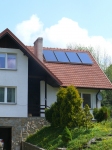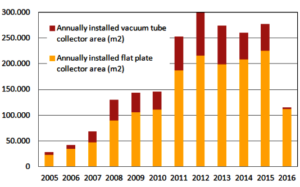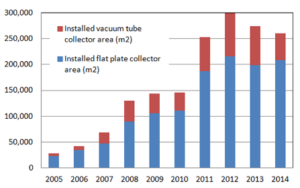Poland: Unclear Political Framework in 2014
October 19, 2013Business satisfaction in the Polish solar thermal industry is declining: The ISOL Business Index developed by German market research agency solrico achieved high scores above 50 points in 2010 and 2011, but is now down to almost 40 in the latest survey from October 2013. The ISOL Index is a barometer for the development of the solar thermal market on a national, regional and global level. It is a point-based indicator showing the satisfaction of the solar thermal industry players with current and future business opportunities. The cause of this downward trend lies in the uncertainty surrounding the political frame conditions in Poland over the coming years. The companies which took part in the survey assume a rather stagnating market or maybe a slight increase next year – after two years of growth rates between 30 and 60 %.
What has happened? First of all, the grant scheme of the National Fund for Environmental Protection and Water Management (NFOŚiGW) is said to run out of money in the middle of 2014. In addition, the interim financial mechanism, called Prosument, seems to be coming too late. “We are waiting with Prosument until the RES law has been passed, because we have to know what the intended return of investment will be for a given technology, as this influences the level of proposed support,” Witold Maziarz, NFOŚiGW’s spokesman, says.
The RES Law is still a long way from being approved since the Ministry of Economy presented general provisions of the draft’s third version in a Power Point presentation in the middle of September. They are in complete contrast to previous versions – no green certificates, no feed-in tariff and just a tender-based system all with regard to the renewable electricity sector. This means that once the draft has been finalised, it has to be again submitted for public consultation before it can be accepted by the government and approved by the parliament. “I hope it will pass by the end of 2015,” Andrzej Czerwiński, Head of the Parliamentary Energy Commission, says.
The Prosument programme to support solar thermal, heat pumps and photovoltaics was to be launched in 2014, in order to close the gap between the current solar thermal grant scheme and the new EU funds, which will effectively reach Poland no earlier than 2016. The entire programme budget for 2014-16 amounts to Polish Zloty (PLN) 600 million (EUR 144 million), with a still unspecified share of solar thermal. According to an NFOŚiGW official who did not want to be named, the fund considers low-interest loans rather than grants as support mechanisms for solar thermal.
On the other hand, the solar thermal market may experience impulses for growth thanks to the planned PLN 5 billion anti-smog law (EUR 1.2 million), which will ban coal from being used as a residential heat source from 2020 on. This idea was discussed in the Parliamentary Commission on Environment, Natural Resources and Forestry, SEJM; however, the commission has yet to produce a draft of the law.
According to the Ministry of the Environment, one million Polish homes use coal as a heat source. “We will pay coal users to replace their burners with more environmentally friendly heating boilers,” Stanisław Żelichowski, Head of SEJM, explains the purpose of the planned law. Polish regions Silesia, Małopolska and Łódź will ban coal heating systems in their region even earlier than 2020. The effect on the renewable heating market can already be studied in Krakow, the capital of Małopolska. The municipality will ban coal heating systems from 2014 on, because the city is suffering from above-average emission levels.
This news was written by Marcin Czekanski, a Polish journalist specialised in renewable energies and based in Szczecin, Poland.
More information:
http://www.sejm.gov.pl/komisje/www_osz.htm
http://www.nfosigw.gov.pl/en/


